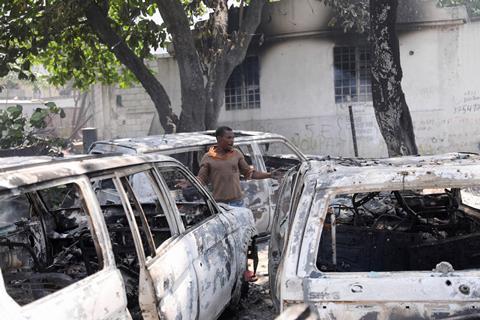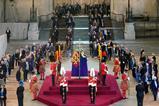After armed gangs took control of Haiti’s capital, Port-au-Prince, last month, violence has led to more than 50,000 people fleeing the city. Lord Leslie Griffiths, who lived in Haiti for many years, makes an impassioned plea for help

Haiti is a country unknown to most people and mystifying to those who claim to know it. It was the richest of France’s colonies until, in the last decade of the 18th century, under the astonishing leadership of Toussaint Louverture and Jean-Jaques Dessalines, its slaves rose up against the army of Napoleon Bonaparte and seized their independence.
A short history
The birth of the “first Black republic in the world” was announced on 1 January 1804. Its troubles began at once.
Just consider: Half a million ex-slaves, released from their plantation labour, were left to sustain themselves by scratching a living from whatever piece of land they could carve out for themselves.
All around them, slavery continued to yield vast fortunes for France, Britain, Denmark, Spain and Holland. None of these countries offered help to the young nation, so Haiti had to fend for itself.
Many NGOs have decided Haiti is too difficult to work in
Denmark and Britain eventually recognised Haiti’s existence in the late 1820s. The Roman Catholic Church in 1860, and the United States had to await the outcome of its own civil war in 1865.
France only recognised Haiti once an indemnity (or reward) was paid to French planters who’d lost their ‘property’ (the slaves!). The debt is estimated to have removed $21 billion from the Haitian economy, and required Haiti to take out expensive loans from international banks. Unending poverty ensued.
From 1915 to 1934, Haiti was occupied by a force of American marines. Its constitution was forcibly altered to allow US corporations to buy land and extract wealth. The oppressive nature of these activities led to a surge in Haitian nationalism and sowed the seeds for the eventual emergence of the dictator Francois Duvalier (known as Papa Doc).
The United Nations failed repeatedly to support Haiti when its democratically elected leaders were usurped or ousted. For 15 years, a UN “peace-keeping and stabilising” force, costing untold billions of dollars, achieved (by its own admission) precisely nothing. It did, however, introduce cholera which has since claimed thousands of lives.
Hurricanes, floods and earthquakes beat down on Haiti with huge loss of life. The 2010 earthquake claimed 250,000 lives and left infrastructure and major buildings destroyed.
The last president, Jovenel Moïse, was assassinated in 2021. Although arrests have been made, so far, his murderers have not been brought to account. The country has slid into chaos with gangs, drug-runners, money-launderers and kidnappers running rife.
Efforts are, at last, being made to find a way out of this mess.
My history
My wife and I, just married, spent a large part of the 1970s in Haiti. I had completed my theological studies at Cambridge and now, under the discipline of the Methodist Church, found myself heading for the Caribbean. I was ordained there and our two boys were born there – in a Haitian hospital under Haitian medical care.
I travelled the length and breadth of the island – by four wheel drive vehicles, on foot, by boat, astride a mule, on a bicycle, by bus. I learnt both of Haiti’s languages fluently and began to see Haiti through the eyes of its peasant majority rather than, more conventionally, through its political class.
I preached the gospel, visited the sick, organised micro-finance programmes, trained teachers, formed candidates for our ministry, served as assistant headteacher of our high school, ran a healthcare project, sank wells, developed networks with overseas supporters and stood up to officials. Always, I sought to develop Haitian leadership.
It infuriates me that the world shows no interest in Haiti’s wellbeing
Later I completed a doctorate and wrote a biography of Jean-Bertrand Aristide, the Roman Catholic priest who became the republic’s first democratically elected president.
Haiti has been grafted onto my heart. I’ve visited regularly and done what I can to promote interest in its cause. It infuriates me that the outside world continues to show no interest in its wellbeing and contents itself with the half-truths, fantasies and downright lies which have shaped Haiti’s reputation.
A call to arms
Many non-governmental organisations have decided that Haiti is too difficult a place to work in. Others, such as Oxfam, have been guilty of widespread abuse. Outsiders seek to impose solutions on Haiti rather than develop its institutions, build leadership or help with needs identified by Haitians themselves.
I remain a firm believer in Haiti. The faith of Haitians - their only freely available resource - has seen them through one crisis after another. They certainly need to dig deep at the moment. And they deserve the support of people around the world, and especially the Christian community.
As for me, I shall never be able to thank them enough for all they’ve given me. I shall speak up for them until my dying day.





































No comments yet